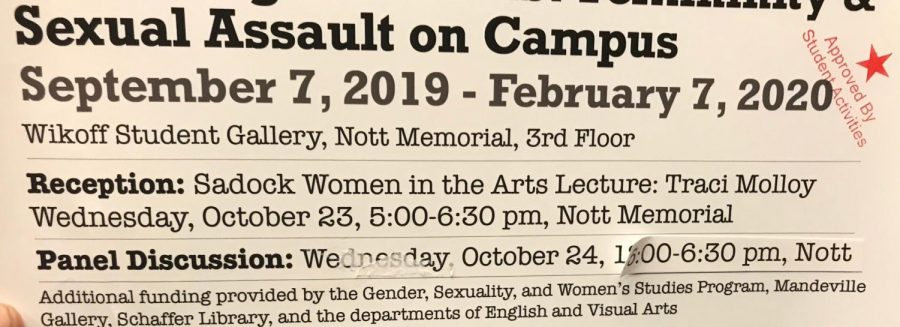An essay in vehement defense of the Oxford comma
October 3, 2019
The Oxford comma is a perfect little piece of punctuation that receives far too much hatred in our society.
Some argue that it contributes to the overuse of the comma in our society, while others argue that it creates ambiguity. In some cases, people dislike that the Oxford comma is “unconventional.” Across the board, however, these criticisms miss the main point of why I find the Oxford comma so near and dear to my heart. But before I get into that, let me explain what an Oxford comma is.
An Oxford comma is the comma that you see before the “and” in a list of three or more things. For example, without an Oxford comma, a sentence looks like the following: “Reamer, Upper and Dutch.” An Oxford comma would be placed after “Upper” in that sentence.
You may be thinking to yourself: “Why am I reading this guy’s rant about the Oxford comma? How does this relate to Union College?” Well, as an avid fan of the Oxford comma, the Concordiensis, and journalism in general, breaks my heart.
Newspapers across the country use the Associated Press-style guidelines for grammar and punctuation, which forbids the use of the Oxford comma.
But I think this is wrong and that is why I am putting out a rallying cry to all Oxford comma enthusiasts: Don’t let the evil journalists and newspapers tell us how we can and cannot write!
To me, it makes sense to use the Oxford comma in writing. I speak and write as I think – and my thoughts follow a particular “stop” and “go” pattern. This pattern includes the Oxford comma: When I speak a long list of things aloud, I pause between each item on the list, as well as before the “and” that signifies that the last item in that list is coming up.
When I write, I want my reader to be able to enter into my brain and feel that particular flow. Indeed, the act of writing is a deeply personal performance between the writer and the reader – I’m sure any professor of English would agree with this assertion.
The Associated Press’s unequivocal ban on an innocent piece of punctuation prevents me from properly transferring my thoughts to paper, which is really just downright Orwellian. I bet that if the Associated Press had their way, they would declare it thoughtcrime to use the Oxford comma in the comfort of your mind, and they would have you shipped off to the gulag for pausing too much in your normal, everyday speech.
Another point: Consistency. The way I figure, if you’re going to put a comma between every word in a list, you should also put a comma before the final part of the list. It just makes sense. You wouldn’t neglect putting a period before the last sentence of your newspaper article, so why ignore a comma before the end of a list?
In terms of clarity, there are plenty of examples of the Oxford comma both mending and creating ambiguities. On the whole, though, I find the Oxford comma to be more helpful in removing rather than making ambiguities in sentences.
In fact, to illustrate how the absence of an Oxford comma can create ambiguities, I’ll use an example that I found hanging on the wall in the Concordiensis office: “We invited the strippers, JFK and Stalin.” Without the Oxford comma, this sentence denotes that we invited the strippers who happened to be JFK and Stalin, whereas with the Oxford comma, that sentence would indicate that we invited the strippers as well as JFK and Stalin.
The second sentence sounds like a great time, while the first sentence sounds like someone’s fanfiction.
Society – even the Union College community – uses the Oxford common more often than not.
Across campus, Professors use, allow — and sometimes even encourage — propagation of the Oxford comma in academic writings. In emails from professors, facilities and staff, I see the Oxford comma used happily and without regret. On posters and ads across campus, I see Oxford commas sprinkled liberally. If the Oxford comma is good enough for Student Activities, then why isn’t it good enough for journalists?
The Union College community’s extensive and unapologetic use of the Oxford comma is a microcosm of the entirety of Western society.
People like the Oxford comma. It’s everywhere, it’s accepted and at this point it has become the grammatical norm. Journalistic agencies and grammar-stylists should be cognizant of this fact and begin standardizing, rather than ostracizing, the use of the Oxford comma. Words in a language change – why shouldn’t punctuation?
We live in trying times. Journalistic integrity, it seems, is at an all-time low. Media outlets across the world seem to be serving some sort of overlord.
Some argue it is capitalism that is destroying the integrity of the Fourth Estate, while others argue that it is the bought and paid-for politicians. But I wonder if it’s the Oxford comma.
There comes a point in history where things need to change. For the Oxford comma, that time has come. No longer shall the Oxford comma supporters be put down and hated. Rise up, my fellow Oxford comma enthusiasts, because together, we can end this ridiculous punctuation ban that goes against society’s sensibilities.







